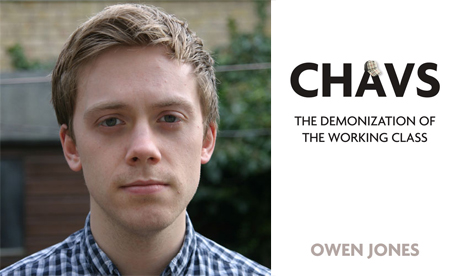Interview: Owen Jones on The Demonization of The Working Class
Pages of Hackney welcomes Owen Jones to the store on Wednesday 20 July to read from his book Chavs: The Demonization of the Working Class, writes David Dawkins.
Owen’s book details how in modern Britain, the working class has become an object of fear and ridicule. From Little Britain’s Vicky Pollard to the demonisation of Jade Goody, media and politicians alike dismiss as feckless, criminalised and ignorant a vast, underprivileged swathe of society whose members have become stereotyped by one, hate-filled word: chavs.
We caught up with Owen, a Stoke Newington resident, to talk through some of the issues raised in his book.
You argue that class hatred has become an integral part of modern British culture. When did this happen?
I know some people roll their eyes when a “blame Thatcher” argument makes an appearance, but we really have to revisit the 80s to understand today’s class hatred. Pillars of working-class Britain came under attack: like trade unions (half of all workers were members in 1979 – it’s about half that today); council housing, which once supported mixed communities; industries like manufacturing and mining, which was the heart of many working-class communities; and values, like solidarity.
As Tory newspaper editor Peregrine Worsthorne put it: “Old-fashioned Tories say there isn’t any class war. New Tories make no bones about it: we are class warriors and we expect to be victorious.”
Being working-class became something to escape from: we were all supposed to become middle-class. It’s in this context that positive images of working-class people disappeared from our TV screens and the media; and that people became blamed for being unemployed or poor.
Was there a particular moment when you decided you wanted to write a book on the demonisation of the working class?
When I was at university I heard students with crisp public school accents attacking ‘chavs’ and people who lived on council estates, and so on. It struck me that they were not only attacking people who they’d never met, but who had not enjoyed all the advantages that they had. But I’d been interested in class from an early age: I was the only boy in my primary school class to end up doing A-Levels, not because I was brighter, but because I had odds stacked in my favour.
At the beginning of the book I discuss being at a dinner party made up exclusively of middle-class professionals: one of them quipped ‘It’s a shame Woolworth’s is closing. Where will all the chavs buy their Christmas presents?’ That could easily have been rephrased as ‘Where will the lower orders buy their Christmas presents?’ No-one in the room would have dreamt of being homophobic, sexist or racist. That drove home how mainstream class hatred had become.
In the book you challenge this commonly held idea that, ‘we’re all middle-class now.’ Have the boundaries altered? Is this really a question of social mobility rather than social classifications or tags?
There’s no denying the working-class looks a lot different than it did thirty years ago. For a start, over 7 million worked in manufacturing – today it’s just over 2.5 million. Instead, there’s a million call centre workers – that’s as many as worked down the pit at the peak of mining. Retail is Britain’s second biggest employer. So there’s been a shift from factories, docks and mines to shops, call centres and offices.
Yes, a lot more people own their homes: but that doesn’t change the fact that most people work for someone else for a living.
There’s also a big chunk of the working-class that lacks secure employment, particularly in the old industrial heartlands. Often they’re demonised as ‘benefit cheats’, even though benefit fraud is estimated to cost £1.2bn a year, compared to £70bn worth of tax evasion.
And politicians talk a lot about ‘Middle England’, but when they do they’re generally talking about well-off people. In reality, if you earn £21,000 a year, then you are slap bang in the middle of the population.
Does class hatred exist to such an extent in Hackney?
Funnily enough, I heard a fairly well-spoken couple debating where they were going to do their shop: one said “We’re not going to Asda, it’s too chavvy”. Class hatred has become entirely mainstream in modern Britain, and sadly Hackney is no exception.
You mention that Thatcher aimed to tear-down the pillars of working-class Britain while New Labour projected an idea of ‘escaping’ one’s background. What’s next?
Above all we need to tackle the crisis of working-class representation in this country. Working-class voices in Parliament and the media have been squeezed out: that has to change. We need to shift power in favour of working people in society: that means a living wage, proper rights in the workplace, and the tax burden shifted on to the shoulders of the wealthy, for example. That people at the bottom are so demonised should ring alarm bells about just how unequal our society has become. If my book achieves anything, it’s a modest contribution towards getting a debate going about these crucial issues.
Pages of Hackney
70 Lower Clapton Road
E5 0RN
020 8525 1452
info@pagesofhackney.co.uk

